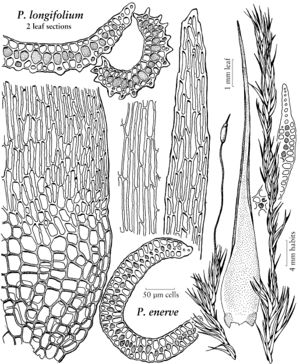Paraleucobryum
Allg. Bot. Z. Syst. 13: 162. 1907,.
| Taxon | Illustrator ⠉ | |
|---|---|---|
 | Paraleucobryum longifolium Paraleucobryum enerve | Patricia M. Eckel Patricia M. Eckel |
Plants in loose to dense tufts, whitish green, grayish green or yellowish green, glossy. Stems 1–4 cm, erect, simple or branched, rhizoids on stems below apex among leaves. Leaves subulate to narrowly lanceolate, gradually acuminate, subtubulose distally, erect-spreading to falcate-secund, especially at stem tips, little changed when dry, smooth; apices acute, sometimes deciduous; margins plane or incurved, serrate to serrulate distally to below leaf middle; laminae unistratose; costa single, percurrent, covering 1/2–2/3 of leaf base and all of subula, smooth or striate on abaxial surface, absent stereids, composed of 3–4 layers of large cells, hyaline, nonchlorophyllose cells intermingled with green, chlorophyllose cells, striations or ridges appearing as rows of teeth at high magnifications on abaxial surface of costa (P. longifolium); leaf cells pitted proximally, smooth, walls of medium thickness, median cells quadrate to rectangular, elongate proximally, alar cells inflated, extending to costa, 1-stratose, brown or sometimes hyaline. Specialized asexual propagation absent. Sexual condition dioicous; perigonia and perichaetia terminal; perigonial leaves ovate, concave, short-acuminate; perichaetial leaves with a broad base, abruptly narrowed to a long awn, inner ones sheathing. Seta solitary or rarely 2 per perichaetium, smooth, elongate, erect, straight to flexuose, twisted when dry, yellowish-brown. Capsule erect to somewhat inclined, cylindric, straight, smooth, irregularly furrowed when dry, a few stomata at base, exothecial walls incrassate; annulus rudimentary; operculum rostrate, straight; peristome single, 16 lanceolate teeth, divided about halfway into 2 segments, papillose above, vertically to obliquely striate below, brown to reddish-brown. Spores 22–33 µm, spherical to ellipsoidal, minutely papillose. Calyptra cucullate, smooth, naked, covering most of capsule, fugacious.
Distribution
North America, Mexico, Europe, Asia
Discussion
Species 3 or 4 (2 in the flora).
Paraleucobryum is a rather peculiar member of the Dicranaceae because of its unique leaf structure. In the leaf cross section there is an adaxial and abaxial layer of hyalocysts and a median layer of chlorocysts. Sometimes a few chlorocysts are in the abaxial layer of cells in some species. Brothera and Atractylocarpus have a very similar leaf structure and are the reason that the three genera are often placed in the same subfamily, Paraleucobryoideae. Both B. H. Allen (1999) and P. Müller and J.-P. Frahm (1987) presented extensive discussion on the relationship of Paraleucobryum to other members of the Dicranaceae. They also discuss what may be heterospory or bimodal spores in P. longifolium.
Selected References
Lower Taxa
Key
| 1 | Costa with longitudinal striations, formed by rows of teeth evident at high magnifications, on abaxial surface (especially conspicuous in distal half); leaf margins serrulate near apex. | Paraleucobryum longifolium |
| 1 | Costa smooth on abaxial surface; leaf margins entire or rarely with a few teeth at apex. | Paraleucobryum enerve |